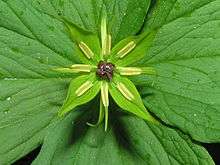Definify.com
Webster 1913 Edition
Paris
Par′is
,Noun.
[From
Paris
, the son of Priam.] (Bot.)
A plant common in Europe (
Paris quadrifolia
); herb Paris; truelove. It has been used as a narcotic. ☞ It much resembles the American genus
Trillium
, but has usually four leaves and a tetramerous flower. Par′is
,Noun.
The chief city of France.
Paris green
. See under
– Green
, Noun.
Paris white
(Chem.)
, purified chalk used as a pigment; whiting; Spanish white.
Webster 1828 Edition
Paris
PAR'IS
,Noun.
Definition 2025
Paris
Paris
Translingual
Etymology
From herb Paris, from French herbe paris, from Latin par (“equal”), in reference to the regularity of its leaves, petals, etc. See image.
Proper noun
Paris f
- A taxonomic genus within the family Melanthiaceae – herb Paris and its relatives, native to Asia and Europe.
Hypernyms
- (genus): Plantae - kingdom; angiosperms, monocots - clades; Liliales - order; Melanthiaceae - family; Parideae - tribe
Hyponyms
- For see
 Paris on Wikispecies.Wikispecies
Paris on Wikispecies.Wikispecies
English
Pronunciation
- IPA(key): /ˈpæɹ.ɪs/
Proper noun
Paris
Translations
Trojan prince
|
|
Etymology 2
Original sense refers to the city in France. From Middle English, from Old French Paris, from Late Latin name of an earlier settlement, Lutetia Parisiorum "Lutetia of the Parisii", from Latin Parisii, a Gaulish tribe, from Proto-Celtic *par (“boat”).
Pronunciation
- (Anglicised) IPA(key): /ˈpæ.ɹɪs/
- (French) IPA(key): /pɑˈri/
Proper noun
Paris
- The capital city of France.
- Any place named after the French city.
- A surname for someone who came from Paris, or a patronymic derived from Patrick.
- A male given name from the surname.
- A female given name of modern usage, usually from the French city.
Derived terms
Derived terms
|
Translations
capital of France
|
|
cities in the US
Statistics
Most common English words before 1923: perfect · bright · scarcely · #732: Paris · expression · Duke · battle
Anagrams
French
Etymology
From Old French Paris, from Late Latin name of an earlier settlement, Lutetia Parisiorum "Lutetia of the Parisii", from Latin Parisii, a tribe of Gaul.
Pronunciation
- IPA(key): /pa.ˈʁi/
- Homophone: pari
Proper noun
Paris m, f (mostly m)
- Paris (in France)
- Paris est beaucoup moins bruyant en été - Paris is much less noisy in summer
- Paris est vraiment belle la nuit - Paris is really beautiful at night
Related terms
Related terms
|
Descendants
Anagrams
Portuguese
Pronunciation
Proper noun
Paris f
Quotations
For usage examples of this term, see Citations:Paris.
Derived terms
Terms derived from Paris
Slovak
Etymology
Borrowing from Ancient Greek Πάρις (Páris).
Pronunciation
- IPA(key): /paris/
Proper noun
Paris m (genitive Parida) declension pattern chlap
- (Greek mythology) Paris
- A male given name from the Trojan hero.
Declension
Declension of Paris
| singulare tantum | |
|---|---|
| nominative | Paris |
| genitive | Parida |
| dative | Paridovi |
| accusative | Parida |
| locative | Paridovi |
| instrumental | Paridom |
Swedish
Pronunciation
- Rhymes: -iːs
Proper noun
Paris
Tatar
Proper noun
Paris
Declension
declension of Paris
| Nominative | Paris |
|---|---|
| Genitive | Parisnıñ |
| Dative | Parisga |
| Accusative | Parisnı |
| Locative | Parisda |
| Ablative | Parisdan |
References
Turkish
Pronunciation
- IPA(key): [pɑːɾis]
- Hyphenation: pa‧ris
Proper noun
Paris
Declension
declension of Paris
| singular | plural | |
|---|---|---|
| nominative | Paris | Parisler / Paris'ler |
| accusative | Paris'i | Parisleri / Paris'leri |
| dative | Paris'e | Parislere / Paris'lere |
| locative | Paris'te | Parislerde / Paris'lerde |
| ablative | Paris'ten | Parislerden / Paris'lerden |
| genitive | Paris'in | Parislerin / Paris'lerin |
